|
|
|
Sort Order |
|
|
|
Items / Page
|
|
|
|
|
|
|
| Srl | Item |
| 1 |
ID:
154538
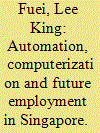

|
|
|
|
|
| Summary/Abstract |
Digitalization is expected to radically change the prospects of the types of occupations that will be needed in the future. This research note examines the susceptibility of jobs to computerization and automation in Singapore by drawing on the methodology and initial data in Frey and Osborne (2013). We find that about one-quarter of Singaporean employment is at high risk of computerization. This places the country as having one of the lowest proportions of jobs under high risk internationally. Within this high-risk category of workers, a significant number of them have non-tertiary educational qualifications and tend to be older adults, making them less likely to be re-employed if they lose their jobs.
|
|
|
|
|
|
|
|
|
|
|
|
|
|
|
|
| 2 |
ID:
154539


|
|
|
|
|
| Summary/Abstract |
Myanmar's trade deficit has widened dramatically in the past few years. One of the reasons lies in the lack of trade finance for exporters and certain financial sector shortcomings more generally. This policy note introduces the idea of establishing a public Export Credit Guarantee Scheme (ECGS) and explores if and how this policy measure could support the rebalancing of Myanmar's trade deficit. Such a scheme could help relieve export constraints by: first, facilitating access to credit for exporters by mitigating risk and increasing banks' willingness to lend; second, helping exporters to offer better payment terms to importers; and third, contributing to enhance confidence in Myanmar entities (both banks and enterprises) among foreign entities. Looking at the experience of other countries, the policy note also points to a number of guiding principles that policymakers should consider when pondering the idea of setting up an ECGS. Moreover, it highlights that certain challenges have to be expected. First and foremost, given the low level of financial sector development and limited existing knowledge on trade finance, it is questionable whether the necessary skills and capacities to properly operate such a scheme are available in Myanmar. Seeking international support can help to address this issue. A practical way forward might be to pilot an ECGS with a rather small portfolio of products that targets one or a few sectors to test the ground while limiting the public resources at risk.
|
|
|
|
|
|
|
|
|
|
|
|
|
|
|
|
| 3 |
ID:
154532
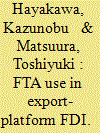

|
|
|
|
|
| Summary/Abstract |
Multinational enterprises (MNEs) actively use overseas affiliates to trade with third countries (i.e., neither the home country nor host country). In this paper, we empirically identify significant firm characteristics that influence the use of FTAs in export-platform Foreign Direct Investment (FDI). Specifically, we investigate the correlation of FTA use with: the share of "originating inputs"; intensity of exports to the third country; and experience using FTAs in exporting to other third countries. Then, we further investigate the difference in such characteristics according to the size of the parent company in order to clarify why the use of FTAs from platform countries is different between overseas affiliates owned by large firms versus small- and medium-sized enterprises (SMEs). To this end, we employ a unique dataset collected by the Japan External Trade Organization for 2012 and 2013. We found that Japanese affiliates owned by large parent firms are more likely to use FTA schemes in exporting than those owned by SMEs. In terms of Rules of Origin (ROO) compliance however, most affiliates owned by either SMEs or large parent companies have no difficulty because they already have a sufficiently high share of originating inputs. Therefore, we find that the major obstacle to FTA utilization concerns how to obtain certificates of origins (COOs) rather than complying with ROOs.
|
|
|
|
|
|
|
|
|
|
|
|
|
|
|
|
| 4 |
ID:
154534
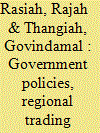

|
|
|
|
|
| Summary/Abstract |
Several governments, including Malaysia's, have promoted small and medium enterprises (SMEs) for the socio-economic benefits such policies bring. Since the 1990s, Malaysian SMEs have progressed to take advantage of the exporting opportunities opened up by regional trading arrangements (RTAs). Using the electronics industry, which is prevalent in the manufacturing sector of Malaysia, this paper seeks to analyse the relationships between size and technological and performance variables. While foreign electronics firms in Malaysia have been thoroughly studied in the past, this paper focuses on national firms, which have been understudied thus far. SMEs show stronger participation in exports to ASEAN countries than large firms. Size did not matter in the intensity of use of technological capability variables. The government's initiatives to support them with ICT infrastructure, and trade promotion may have been successful. Also, RTAs show significant importance as the relationship between firms using them and intensity of exports to ASEAN and Northeast Asia is positive and strong. Also, while the incidence of participation in in-house R&D (IHRD) and training expenditure in payroll (TEP) is higher among firms that have used RTA instruments compared to firms that have not, firm size was not significant.
|
|
|
|
|
|
|
|
|
|
|
|
|
|
|
|
| 5 |
ID:
154536
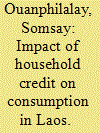

|
|
|
|
|
| Summary/Abstract |
This study evaluates the impact of credit on consumption in Laos. A two-stage selection bias correction method based on a multinomial logit framework is used to estimate and compare the consumption of borrowing households with and without credit. The results show that compared to what household consumption would have been without credit, borrowing households tend to have higher overall consumption. However, when consumption is disaggregated into food and nonfood, it is found that only formal credit has a positive impact on food spending. Borrowing from semiformal sources and informal sources without interest has a negative impact on food spending. For nonfood consumption, the impact of credit is found to be positive and statistically significant for all credit sources.
|
|
|
|
|
|
|
|
|
|
|
|
|
|
|
|
| 6 |
ID:
154535
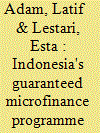

|
|
|
|
|
| Summary/Abstract |
This paper analyses the first stage of the Kredit Usaha Rakyat (KUR) programme, the guaranteed microcredit programme for supporting the development of SMEs in Indonesia. KUR is a partial credit guarantee programme that helps to fulfil the collateral requirement hindering SMEs from accessing credit. By gaining access to credit, SMEs are expected to develop while also creating employment and generating income for the poor and near poor. Based on KUR's loan disbursement, its number of participating banks, and its number of borrowers, this paper shows that the implementation of the programme attracted millions of SMEs. This paper then highlights the ways in which KUR has or has not addressed market failures in the credit market for SMEs. This paper also shows that KUR's role in accelerating poverty reduction is still questionable as there are many poor households unable to access the programme. Hence, the main policy challenges are: first, improving the design of KUR to reduce information asymmetry; second, ensuring that KUR meets its anti-poverty objectives by reaching the right sectors and the right regions; and third, strengthening the KUR Policy Committee's oversight and ability to coordinate across key stakeholders.
|
|
|
|
|
|
|
|
|
|
|
|
|
|
|
|
| 7 |
ID:
154537
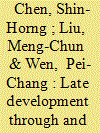

|
|
|
|
|
| Summary/Abstract |
This research note investigates the nature of Taiwan's economic links with Southeast Asia. While it is assumed that the economic links are driven by investment and formal trade agreements, we identify a more intertwined dynamic of "deep integration" through Global Value Chains (GVCs). We first examine the macro data of Taiwanese direct investment and bilateral trade with ASEAN member countries. Next, we discuss "the trade-investment-service-IP nexus" through the case of the textile and apparel industry in Taiwan, which evolved with the GVC led by brand marketers in advanced countries, cementing economic linkages between Taiwan and Southeast Asia. We then explore new patterns of Taiwanese development through exporting "good enough innovations" and "total solutions" in the region.
|
|
|
|
|
|
|
|
|
|
|
|
|
|
|
|
| 8 |
ID:
154531


|
|
|
|
|
| Summary/Abstract |
This paper examines exchange rate behaviour in the ASEAN-5 countries (Indonesia, Malaysia, the Philippines, Singapore, and Thailand). It finds that for the last ten years, there is no evidence that their central banks target particular exchange rate levels against any currency or basket. Thus, contrary to some assertions, they do not belong to a dollar club, a yen club, a renminbi club, or an ASEAN club. At the same time, they clearly try to smooth short-term volatility, particularly vis-à-vis the U.S. dollar. The degree of smoothing declined noticeably after the Asian Financial Crisis and less obviously after the Global Financial Crisis, with heterogeneity across countries. Short-term smoothing without level targeting does not interfere with monetary policies aimed at price stability.
|
|
|
|
|
|
|
|
|
|
|
|
|
|
|
|
| 9 |
ID:
154533
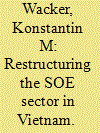

|
|
|
|
|
| Summary/Abstract |
This paper assesses Vietnam's recent experience with reforming its state-owned enterprise (SOE) sector and discusses potential ways forward. It does so by: reviewing the economic principles that account for the motivations and shortcomings of state ownership; taking stock of stylized facts about the SOE sector; and assessing the legal and institutional reforms and equitizations that have taken place over the last years. The current focus on microeconomic approaches to firm productivity is highly misleading and a broader reform perspective of Vietnam's development model is needed. While there is little compelling evidence that the state of the SOE sector is as dismal as some analysts suggest, the paper highlights an increasing implementation lag of the legal reform progress — reflecting fault lines in Vietnam's political economy. SOEs can and should play a vital role in Vietnam's development strategy going forward. However, a more precise vision for the sector, based on a more elaborate assessment of market failures and externalities in different parts of the economy, is needed.
|
|
|
|
|
|
|
|
|
|
|
|
|
|
|
|
|
|
|
|
|